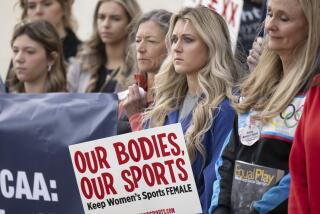Gathers Suit Asks for $32.5 Million
- Share via
A Beverly Hills attorney representing the family of Hank Gathers filed a $32.5-million suit Friday claiming the former basketball star died because of questionable and negligent medical practices, and a conspiracy between Loyola Marymount Coach Paul Westhead and doctors to ensure Gathers would continue playing.
Gathers, a Loyola Marymount basketball player, collapsed March 4 at Gersten Pavilion while playing in a West Coast Conference tournament game, and was pronounced dead 1 hour 40 minutes later at Daniel Freeman Marina Hospital. An autopsy determined the cause of death to be cardiomyopathy, a heart disorder.
The 52-page complaint, filed in Los Angeles County Superior Court by attorney Bruce Fagel, names 14 defendants and cites six causes of action. It was filed on behalf of Gathers’ mother, Lucille, brothers Derrick and Charles, and an aunt, Carol Livingston. It is the first suit to be filed in connection with Gathers’ death.
The 14 defendants are Loyola Marymount University and four Loyola employees--Athletic Director Brian Quinn, Westhead, trainer Chip Schaefer and Dr. Dan Hyslop of the university’s Health Services. Doctors named are internist Michael Mellman and his company, Mellman and Moe; cardiologists Vernon Hattori and Charles Swerdlow and their company, Apex Cardiology Consultants; Ralph Gambardella, Clarence Shields and Benjamin Schaeffer, all Loyola team physicians supplied by the Kerlan-Jobe Orthopedic Group, which also was named.
One of the actions--fraudulent concealment--charges that Westhead and Quinn conspired with Hattori, Swerdlow and Mellman and team physicians to conceal medical information from Gathers and his family so that he would continue playing.
The suit also charges Gathers’ condition was more serious than he or his family was informed.
The suit alleges that Westhead--not Gathers--at least twice requested that Hattori change or reduce Gathers’ heart medication, the beta blocker Inderal, to improve his performance on the basketball court. One of the side effects of the drug is sluggishness.
Westhead denied the allegations against him.
“As his coach, I did my best for Hank Gathers,” Westhead said in a statement Friday. “I was never part of the medical decisions concerning Hank. I did not decide what medication to prescribe or what dosage to take. I feel badly that my relationship with Hank and his family could be distorted with this legal action.”
In a news conference Friday, Fagel displayed a copy of a letter from medical records that was written by Hattori to Mellman and dated Jan. 29. In the letter, Hattori states that he and Gathers met the week before to discuss whether or not Gathers was satisfied with his level of performance.
“He (Gathers) indicated to me at that time that he felt his performance was fine, and that there were no depressing effects of the medication at the dose he was taking. Later on over the weekend, I got a call from his coach, indicating that his athletic performance was still substantially sub-par, and that he (Westhead) felt strongly that the medication should be changed.
“I met with Hank again today (Jan. 29), and had another discussion with him . . . I did emphasize . . . that a changeover to that agent (another drug) would require at least four to five days with the possibility of missing a game during the adjustment period. Hank felt that decreasing Inderal from 40 (milligrams) three times a day to 40 twice a day would be his preference. I therefore decreased his dosage to that level and plan on repeating a Holter (monitor) examination in 48 hours.”
Fagel claims there was no need to reduce Gathers’ medication on Jan. 29 because Gathers was playing well. Gathers averaged 29 points in four games between Jan. 19-27. Fagel also claims that Westhead called Hattori March 2, two days before Gathers died, and pressured him to further reduce the medication to 20 milligrams twice a day. Fagel, who says Hattori related the March 2 conversation with the family, says that Hattori complied with the alleged request.
C. Snyder Patin, attorney representing Hattori, said he would not discuss the case.
“We will try our case in a court of law,” he said. “We think it is unprofessional for the plaintiffs’ attorney to act in the way they have been acting, attempting to generate publicity.”
Patin said in California jurors are instructed to make a decision on the issue of medical negligence exclusively on the testimony of expert witnesses.
In questioning the medical practices, Fagel asserted that doctors allowed Gathers to return to the court before performing all necessary tests.
The suit alleges that a Dec. 26 test, which came five days after Gathers was released to the team, revealed non-sustained ventricular tachycardia, which is a rapid heartbeat caused by abnormal impulses from a single area of the heart. The disorder can produce symptoms of fainting, dizziness, weakness and eventually unconsciousness leading to cardiac arrest.
The test showed a rate of almost 200 beats per minute, far above an acceptable level.
The suit alleges the Dec. 26 test showed Gathers should not have been allowed to play. The suit cited recommendations in a 1985 article from the Journal of America College of Cardiology, which was written from the Bethesda Conference’s “Cardiovascular Abnormalities in the Athlete,” and is considered to be basic guidelines by cardiologists.
The article states that patients who have structural disease, a history of syncope, ventricular tachycardia exceeding 150 beats per minute during exertion and other problems “may not engage in competitive sports.”
It further states that patients who experience no problems for six months while using an antiarrhythmic drug such as Inderal could participate in low intensity activity.
“What was the rush to get him back on the court?” Fagel asked. “The timing of these tests do not make sense.”
Other allegations charge negligence by Hyslop, Schaeffer and trainer Schaefer when Gathers collapsed. The complaint states that they did “nothing of a medical nature for Gathers for a period in excess of 2 minutes and 45 seconds.”
Martin L. Burke, attorney for Loyola Marymount, said: “We expect the University and its members will be fully vindicated.”
Burke and the other defending attorneys have 60 days to answer the complaint before depositions will begin.
University officials said in a statement: “Loyola Marymount University is deeply saddened by the charges leveled at the University and members of the University’s staff.”
Fagel said he filed the suit on a legal “fast-track,” which, if accepted, could mean a trial date within 12 to 18 months.
Also attending the news conference were Adrian Moody and Martin Krimsky, the Philadelphia attorneys who represent Gathers’ son, Aaron Crump, 6. Krimsky and Moody plan to file a wrongful death suit on behalf of Aaron in two weeks. Once filed, it will be combined with Fagel’s complaint.
Krimsky also said he will file a $1-million suit on behalf of the Gathers’ estate, of which he is administrator.
Times staff writer Alan Drooz contributed to this story.
More to Read
Get our high school sports newsletter
Prep Rally is devoted to the SoCal high school sports experience, bringing you scores, stories and a behind-the-scenes look at what makes prep sports so popular.
You may occasionally receive promotional content from the Los Angeles Times.






